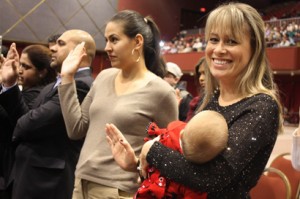
“You are now part of the American dream.”
With that phrase, U.S. District Judge David Bartick welcomed 506 people whom he had just sworn in as U.S. citizens in a naturalization ceremony held Wednesday morning.
Participants included 19 active duty military personnel, who sat in their uniforms in the front row at Golden Hall, at the San Diego Civic Center, where the event was organized by U.S. Citizenship and Immigration Services (USCIS).
The federal agency holded rotating naturalization ceremonies for an additional 500 people on Friday (Dec. 21) at its Chula Vista Field Office, at 8 a.m.
On Wednesday, Latinos comprised the largest group of new citizens, who came from Argentina to Vietnam, though the largest group hailed from Mexico.
“You are now equal to every other citizen of the United States,” the judge told the group of men and women of all ages, including several who pushed walkers and one who struggled to sit up in a wheelchair. “And with your new status comes new rights and responsibilities.”
One of those is being able to vote.
Juan Garcia wasted no time preparing himself to do just that. After the ceremony, he walked to a table steps from the Civic Center and registered to vote.
Afterward, he reflected on why he became a U.S. citizen.
“I’ve always loved this country,” said Garcia, who said he had arrived with two brothers from the Mexican state of Guerrero in 1985, at age 18.
Now 43 years old, married and with four children born in this country, he figured he was overdue to become a citizen.
“My brothers became citizens years ago,” he said. “They kept telling me, ‘You’re falling behind.’”
Garcia looks forward to voting, including some day helping to elect a president.
An estimated 150,000 residents in San Diego County are eligible to become U.S. citizens.
The National Association of Latino and Elected Officials (NALEO) Educational Fund has a bilingual website, ciudadania.yaeshora.info, that offers step-by-step information about how to become a citizen. And the organization partners with local non-profit organizations to offer free or low-cost workshops to help immigrants prepare their citizenship application.
Tijuana native Abigail Hildick posed for photos with her daughters and husband after the naturalization ceremony. She did not hesitate when asked why she became a citizen.
“For my family,” she responded, smiling.